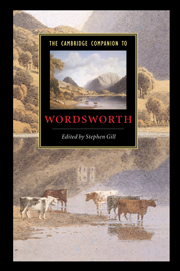Book contents
- Frontmatter
- Introduction
- 1 Wordsworth: the shape of the poetic career
- 2 Wordsworth's poetry to 1798
- 3 Poetry 1798-1807
- 4 'The noble living and the noble dead'
- 5 Wordsworth and The Recluse
- 6 Wordsworth and the meaning of taste
- 7 Wordsworth's craft
- 8 Gender and domesticity
- 9 The philosophic poet
- 10 Wordsworth and Coleridge
- 11 Wordsworth and the natural world
- 12 Politics, history, and Wordsworth's poems
- 13 Wordsworth and Romanticism
- 14 Wordsworth and America
- 15 Textual issues and a guide to further reading
- Index
- Series List
8 - Gender and domesticity
Published online by Cambridge University Press: 28 May 2006
- Frontmatter
- Introduction
- 1 Wordsworth: the shape of the poetic career
- 2 Wordsworth's poetry to 1798
- 3 Poetry 1798-1807
- 4 'The noble living and the noble dead'
- 5 Wordsworth and The Recluse
- 6 Wordsworth and the meaning of taste
- 7 Wordsworth's craft
- 8 Gender and domesticity
- 9 The philosophic poet
- 10 Wordsworth and Coleridge
- 11 Wordsworth and the natural world
- 12 Politics, history, and Wordsworth's poems
- 13 Wordsworth and Romanticism
- 14 Wordsworth and America
- 15 Textual issues and a guide to further reading
- Index
- Series List
Summary
She was totally ignorant of housewifery & could as easily have managed the spear of Minerva as her needle. It was from observing these deficiencies that one day, while she was under my roof, I purposely directed her attention to household economy & told her I had purchased Scales wh. I intended to present to a young lady as a wedding present, pointed out their utility, (for her especial benefit) & said that no ménage ought to be without them.
Readers who think of Wordsworth as a visionary poet with his head in the clouds would be surprised to discover that these were his words. Such concern with the minutiae of domestic life as getting, spending, and weighing might not seem Wordsworthian. But these thoughts were on the seventythree-year-old poet's mind when he dictated notes on his poetry to his friend Isabella Fenwick. Ah, the puzzled reader might now say, these are the concerns of the stodgy old poet, not the fiery young man of the 1790s. But I will argue here that from an early age Wordsworth was concerned with home-making and with the dynamics of gender within 'household economy'. While we do see a shift in emphasis from the early to later years (an embracing of Victorian domesticity), the idea of domesticity as the source of family, love, and stability remains a constant in Wordsworth's life and work.
Paradoxically, too, Wordsworth’s critique of housewifery in the quoted passage referred to the popular poet Felicia Hemans, a woman who did not find the kind of domestic happiness in her own life that she praised in her poetry. Hemans might not have managed Minerva’s spear or a nineteenth-century lady’s needle, but she certainly used her pen to praise the idea of domesticity. In fact, she helped usher in the Victorian view of Wordsworth as soother of the soul and family poet: ‘Thine is the strain to read among the hills / . . . Or by some happy hearth where faces meet.’
- Type
- Chapter
- Information
- The Cambridge Companion to Wordsworth , pp. 125 - 141Publisher: Cambridge University PressPrint publication year: 2003
- 2
- Cited by



